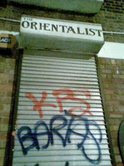To my awe, the conversation instead continued at full bore, shifting to the dreaded democratic deficit debate. Ordinarily framed within the context of the European Parliament, democratic deficit is supposed to gauge the level of disenfranchisement amongst Europe’s variegated citizens. Pro and anti forces, Hix on one and Moravscik on the other, both believe in its general Existence,
The Arguments: a. it does exist, and it does matter; Europe needs politics –Or- b. it does exist, but it does not matter; Europe is only a supranational administrative state.
The illustrious legal colleague to my right proposed a third frame thusly: as long as there is government, there will be those who disagree with it or c. it exists, it may or may not matter, but it is a subjective fact of politics. The problem with the concept itself, he argued, is that it explains Nothing.
Upon further retrospection, I, the mirror as my witness, staged an intervention après coup. These tiny glass shards are what remain:
Indeed, the democratic deficit explains Nothing. The more words exchanged expose three theoretical lies:
One, any talk of a deficit presupposes an extant, therefore recoverable, idea.
Two, pure democracy and administration are possible.
Three, free speech can mask the abyss.
Some other impersonal examples:
1. In Dark Continent, distinguished Columbia Professor Mark Mazower(another dining partner), in alleged opposition to Eric Hobsbawm (Age of Extremes), asserts that the real struggle in 20th Century Europe was that between democracy and Fascism, before examining, in detail, the 70 year struggle between liberal democracy and communism (with a powdering of Nazism in between). In other words, as much as plebeians and elites, low and high, attempt to codify fascism (the radical right or its plus contents), as democracy’s dialectical abyss, the real Beast is the Left.
2. Since the financial crisis, in an effort to prove democracy’s existence via free speech and increased tolerance, the populist Right is given a mass media voice. The Right is naturalised as a genuine expression of frustration and anomie. Anti-immigration and anti-black presidents are rational, if abhorrent, responses. The two are reciprocal: democracy can level its violent excesses; the Right can prove democracy exists. The head of the British National Party, Nick Griffin is given a TV audience. The Tea Party movement dominates the American political scene.
3. Lee C. Bollinger publishes Uninhibited, Robust, and Wide-Open: A Free Press for a New Century.
4. Democracy continues…
April 13 2009 Baltimore Sun (Obama’s 4th Month) Unofficial Opposition
April 15 2009 Wall Street Journal Unofficial Opposition
April 15 2009 CBS News Unofficial Opposition
September 12 2009 Fox News (Obama’s 9th Month) Unofficial Opposition
December 16 2009 MSNBC News (Obama’s 12th Month) Unofficial Opposition
5. March 20 2003
Iraq’s 2nd Year (Other Countries) NY Times, Official Opposition
Iraq’s 4th Year (USA) CBS News, Official Opposition


3 comments:
Interesting. As far as form, execution and credibility are concerned I'd say this is so far, your best piece...or at least my favorite at any rate. But are you implying that academia is ultimately, impotent in being able to deal with issues of political sabotage and subterfuge under the guise of 'democracy?' Are you implying that academia acts merely as another dominant ideological apparatus or worse, that academia (academics*) is irrelevant to real action altogether? Is it all of these, a combination of some or have I completely missed the mark?
As opposed to in-credible before? Or does this refer to -name left unsaid- school of sourcing? These are difficult questions but I would say that this is not necessarily wholly targeted at the ineptitude of academia. The academic juxtaposition is more useful as an interpersonal foil to the structural void of democracy. They presume, at least superficially, that there exists no hierarchy within the democratic realm of informal discussion. But their very expertise owes to the imposition of stratification. I am therefore the democratic abyss. Think Lyotard there. Free speech then is a totalitarian abomination.
I think we can all agree that ideology must be recognised to be in the deed, not simply (or even at all) in the thought.
In a way free speech has become caught in a false problematic: it is still thought that it at least partially reflects some pure, rational thought. But as soon as free speech becomes recognised as just that -ie when speech becomes an act of Free Speech -an actional efficacy comes into play, and irrespective of the ideological content of the free speech act, the free speaking becomes part of the liberal game.
How to not speak freely? "Totalitarian abomination" is right. I advocate completely openly ideological speaking, the open speech of the ideology, with no freedom because of the "problematique" in which you are ensnared.
But the academy is not just an ideological apparatus designed to toy with free speaking and "radicalism", even if the actual positionality of professors belies their non-hierarchical informality. The academy is a site like any other, to be destroyed, subverted, infiltrated, conquered, whatever. There is no "how do the ivory towers relate to real struggles on the street". The academy is a "street".
Just for the record, my speech is not free, it is wholly conditioned, I am merely a conduit. Also, if you read this, you owe me $40.
Post a Comment